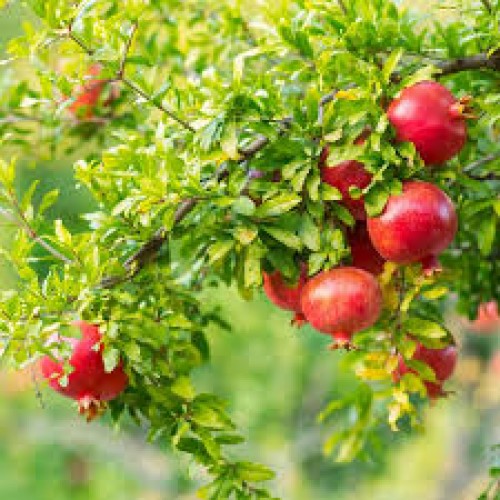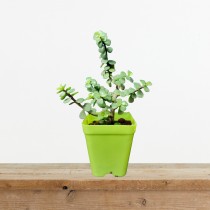off
-
Sold
-

out
Pomegranate (Anar) Fruit: Care, Advantages & Nature
The Pomegranate (known as Anar in Hindi and other Indian languages) is a fruit-bearing shrub or small tree that produces a round, leathery-skinned fruit filled with jewel-like seeds. Pomegranates are native to the region stretching from Iran to northern India, but they are now grown in many parts of the world due to their numerous health benefits and culinary uses. The fruit is not only delicious but also packed with nutrients, making it a popular choice for gardeners and fruit enthusiasts alike.
Care of the Pomegranate Plant
The Pomegranate plant is relatively low-maintenance but does require some attention for optimal growth and fruit production. Here are key care guidelines:
- Climate: Pomegranates thrive in hot, dry climates and are best suited for subtropical and tropical regions. They require at least 6 hours of full sunlight daily for healthy growth and fruiting.
- Soil: The plant prefers well-drained, slightly acidic to neutral soil with a pH level between 5.5 and 7.0. Sandy loam or clay-loam soils work best, but the tree can tolerate poor soils as long as they have good drainage.
- Watering: Pomegranates are drought-tolerant once established, but they need regular watering during the growing season to produce quality fruit. Avoid over-watering, as it may lead to root rot. Water deeply but infrequently, especially during dry spells.
- Fertilization: The plant benefits from periodic feeding with balanced fertilizers. During the growing season, applying a slow-release fertilizer or organic compost can encourage strong growth and better fruiting.
- Pruning: Regular pruning helps maintain the shape of the tree and removes dead or diseased wood. This also promotes better air circulation, reduces pest problems, and encourages better fruit production.
- Pest & Disease Control: Pomegranates are generally resistant to many pests but can be affected by aphids, mealybugs, or fungal diseases. Regular inspection and organic pest control methods like neem oil can help keep these in check.
Advantages of the Pomegranate Plant
- Nutrient-Rich Fruit: Pomegranates are loaded with vitamins and minerals, including vitamin C, potassium, folate, and fiber. They are also rich in antioxidants like polyphenols, which have anti-inflammatory and anti-cancer properties.
- Health Benefits: Pomegranate juice and seeds have been shown to improve heart health by reducing cholesterol, lowering blood pressure, and improving blood flow. They are also beneficial for digestion, skin health, and boosting the immune system.
- Delicious and Versatile: The pomegranate’s seeds (arils) can be eaten fresh, added to salads, yogurt, or smoothies, or used to make juice. The fruit is also a popular ingredient in many culinary dishes and desserts.
- Low Maintenance: Once established, pomegranate plants require little maintenance and are highly drought-tolerant. They are well-suited for xeriscaping or low-water gardens, making them an eco-friendly choice.
- Ornamental Value: Pomegranate plants have beautiful, glossy leaves and vibrant red or orange flowers that are attractive in gardens. They are commonly grown as ornamental shrubs due to their striking appearance and fruit production.
- Long Fruit-Bearing Life: Pomegranate trees have a long productive life and can bear fruit for up to 15–20 years if properly cared for. This makes them a valuable, long-term investment for fruit growers.
Nature of the Pomegranate Plant
The Pomegranate tree is a deciduous shrub or small tree that typically grows between 6 to 10 feet (1.8 to 3 meters) in height. It has a bushy, multi-stemmed form with slender branches covered in glossy green leaves. In late spring and early summer, the tree produces striking, funnel-shaped flowers, which are usually red or orange in color and attract pollinators like bees and butterflies.
The fruit develops after the flowers are pollinated, taking several months to mature. Pomegranates are round, with thick, leathery skin that can range in color from yellow-orange to deep red. When the fruit is cut open, it reveals hundreds of small, ruby-red seeds, each encased in juicy arils that are sweet, tart, and delicious.
The Pomegranate plant is drought-resistant and thrives in arid or semi-arid regions. It is highly tolerant of heat and can withstand long periods without water once established. This makes it an excellent choice for gardeners in dry climates or those seeking low-maintenance fruit plants.
Conclusion
The Pomegranate (Anar) plant is a versatile and beneficial addition to any garden. With its beautiful flowers, health-boosting fruit, and relatively easy care requirements, it is a favorite among fruit growers and gardeners worldwide. Whether you're growing it for its ornamental value, for delicious fruit, or for its numerous health benefits, the pomegranate plant will prove to be a rewarding and fruitful choice.

